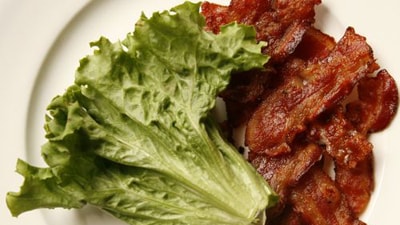Monday, December 14, 2015
VEGETARIAN AND “HEALTHY” DIETS COULD BE MORE HARMFUL TO THE ENVIRONMENT
Carnegie Mellon Study Finds Eating Lettuce Is More Than Three Times Worse in Greenhouse Gas Emissions Than Eating Bacon
By Shilo Rea / 412-268-6094 / [email protected]
Contrary to recent headlines — and a talk by actor Arnold Schwarzenegger at the United Nations Paris Climate Change Conference — eating a vegetarian diet could contribute to climate change.
In fact, according to new research from Carnegie Mellon University, following the USDA recommendations to consume more fruits, vegetables, dairy and seafood is more harmful to the environment because those foods have relatively high resource uses and greenhouse gas (GHG) emissions per calorie. Published inEnvironment Systems and Decisions, the study measured the changes in energy use, blue water footprint and GHG emissions associated with U.S. food consumption patterns.

Eating lettuce is more harmful to the environment than eating bacon.
“Eating lettuce is over three times worse in greenhouse gas emissions than eating bacon,” said Paul Fischbeck, professor ofsocial and decisions sciences and engineering and public policy. “Lots of common vegetables require more resources per calorie than you would think. Eggplant, celery and cucumbers look particularly bad when compared to pork or chicken.”
Fischbeck, Michelle Tom, a Ph.D. student in civil and environmental engineering, and Chris Hendrickson, the Hamerschlag University Professor of Civil and Environmental Engineering, studied the food supply chain to determine how the obesity epidemic in the U.S. is affecting the environment. Specifically, they examined how growing, processing and transporting food, food sales and service, and household storage and use take a toll on resources in the form of energy use, water use and GHG emissions.
On one hand, the results showed that getting our weight under control and eating fewer calories, has a positive effect on the environment and reduces energy use, water use and GHG emissions from the food supply chain by approximately 9 percent.
However, eating the recommended “healthier” foods — a mix of fruits, vegetables, dairy and seafood — increased the environmental impact in all three categories: Energy use went up by 38 percent, water use by 10 percent and GHG emissions by 6 percent.
“There’s a complex relationship between diet and the environment,” Tom said. “What is good for us health-wise isn’t always what’s best for the environment. That’s important for public officials to know and for them to be cognizant of these tradeoffs as they develop or continue to develop dietary guidelines in the future.”
CMU’s Steinbrenner Institute for Environmental Education and Research and the Colcom Foundation funded this research.
Related Article:
Weighing Environmental Impacts of Obesity in U.S. Population
Related Links:
‘Poop burgers’ to save the plane??t! Japanese scientist allegedly creates artificial meat from human feces or did he? – ‘Poop burgers’ will be good for the climate because ‘the meatpacking industry causes 18% of our greenhouse gas emissions…hopefully people will be able to overlook that ugly detail (eating human feces) in favor of perks like environmental responsibility’
Now Global Warming Believers Want To Take Away The Joy of Eating Steak

Analysis shows organic farming has increased carbon emissions per acre
Scientists blame the shift to large scale organic farming for the increase
They warn industrial organic farming has led to manure being imported and an increased use of organic pesticides and insecticides on the land
They say the original sustainable ideals of organic farming have been lost




